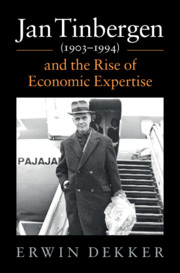Book contents
- Jan Tinbergen (1903–1994) and the Rise of Economic Expertise
- Historical Perspectives on Modern Economics
- Jan Tinbergen (1903–1994) and the Rise of Economic Expertise
- Copyright page
- Dedication
- Contents
- List of Figures/Tables
- Preface
- Acknowledgments
- Part I Becoming an Economic Expert
- Part II The Years of High Expertise
- 8 From The Hague to Geneva
- 9 Fascism at Home
- 10 Tinbergen’s Theory of Economic Policymaking
- 11 The Expert in the Model, the Economist outside the Model
- Part III Global Expertise
- Part IV The Limits of Expertise
- Bibliography
- Index
- Series page
11 - The Expert in the Model, the Economist outside the Model
from Part II - The Years of High Expertise
Published online by Cambridge University Press: 11 June 2021
- Jan Tinbergen (1903–1994) and the Rise of Economic Expertise
- Historical Perspectives on Modern Economics
- Jan Tinbergen (1903–1994) and the Rise of Economic Expertise
- Copyright page
- Dedication
- Contents
- List of Figures/Tables
- Preface
- Acknowledgments
- Part I Becoming an Economic Expert
- Part II The Years of High Expertise
- 8 From The Hague to Geneva
- 9 Fascism at Home
- 10 Tinbergen’s Theory of Economic Policymaking
- 11 The Expert in the Model, the Economist outside the Model
- Part III Global Expertise
- Part IV The Limits of Expertise
- Bibliography
- Index
- Series page
Summary
Chapter 11 is the second of three chapters reflecting on the rise of economic expertise during the twentieth century. It utilizes the famous Lucas critique of econometric models to explore the role and position of the economic expert and economist. It demonstrates how central Tinbergen’s decision models were for the Lucas critique, which was framed completely in Tinbergen’s terms. The critique was mostly justified since the models of Tinbergen implicitly relied on an asymmetry between the policymaker making decisions and other economic actors making decisions. That asymmetry is mirrored in Tinbergen’s perspective on public and expert knowledge, and the role of experts in a democratic society. Lucas correctly identified a crucial tension between democratic ideals and expert decision-making, but he also incorrectly equated changes in decision variables with changes in the institutional structure of the economy, and therefore made the world (too) flat. In conclusion, it is useful to distinguish between the economist concerned with the comparison of alternative institutional arrangements and the economic expert concerned with policy decisions. Both strands are shown to be present in Tinbergen’s work, who at times wrote as economist about institutional design and at times as policy expert about optimal policies.
- Type
- Chapter
- Information
- Jan Tinbergen (1903–1994) and the Rise of Economic Expertise , pp. 249 - 258Publisher: Cambridge University PressPrint publication year: 2021



